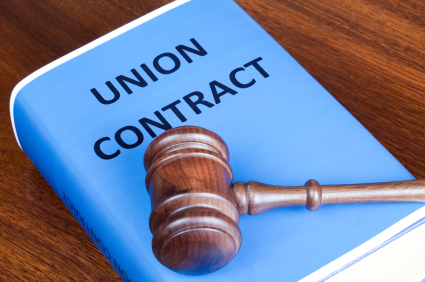Showing 10 posts in National Labor Relations Board.
Time to Revisit Your “Standard” Employment and Separation Agreements
 A recent flurry of activity from the National Labor Relations Board and its General Counsel has many employers rethinking “standard” contract clauses which employers have routinely included in employment or separation agreements. Read More ›
A recent flurry of activity from the National Labor Relations Board and its General Counsel has many employers rethinking “standard” contract clauses which employers have routinely included in employment or separation agreements. Read More ›
Categories: Contracts, Employment, Labor Relations, National Labor Relations Board
NLRB Puts Employment Handbooks Under More Scrutiny
 Employers often have workplace policies which are typically contained in an employment handbook. These handbooks may include policies regarding the confidentiality of business information, the use of cell phones during work, employer internal investigations, the taking of pictures and recordings at work, and not bad-mouthing the company, among others. On August 2, 2023, the National Labor Relations Board (NLRB) issued a decision that will have a major impact on employers seeking to implement and enforce workplace rules and policies. Read More ›
Employers often have workplace policies which are typically contained in an employment handbook. These handbooks may include policies regarding the confidentiality of business information, the use of cell phones during work, employer internal investigations, the taking of pictures and recordings at work, and not bad-mouthing the company, among others. On August 2, 2023, the National Labor Relations Board (NLRB) issued a decision that will have a major impact on employers seeking to implement and enforce workplace rules and policies. Read More ›
Categories: Employee Handbook, Employment, Labor Relations, National Labor Relations Board
Wage and Hour Law 101 for Employers
 Every employer and HR department has reviewed wage and hour laws, but even for the most experienced companies, a few common questions always come up.
Every employer and HR department has reviewed wage and hour laws, but even for the most experienced companies, a few common questions always come up.
- How much do I have to pay?
- What will wages look like in the next few years?
- Does a bonus affect overtime?
- What type of damages could I face if I don’t pay employee's properly?
- How do I stay out of the crosshairs of the government?
Some of the answers might not be as straightforward as you’d think. Below, we’ve put together some of the most important points on the basics of wage and hour laws and what employers need to know. Read More ›
Categories: Audits, Employment, Labor Relations, National Labor Relations Board, Overtime, Wage and Hour
Employers Beware – Employees May Lawfully Record Workplace Discussions and Activities
 In an effort to guard against workplace meetings or discussions being recorded and uploaded to social media for all to hear, and to protect employees against surreptitious recording of their conversations, many employers have implemented "no recording" policies. One such employer was Whole Foods Markets, which had two no-recording policies in place. Read More ›
In an effort to guard against workplace meetings or discussions being recorded and uploaded to social media for all to hear, and to protect employees against surreptitious recording of their conversations, many employers have implemented "no recording" policies. One such employer was Whole Foods Markets, which had two no-recording policies in place. Read More ›
Categories: National Labor Relations Board
The Danger of a Mail Ballot in a Union Election
 In a recent case before the National Labor Relations Board where a union organizing drive was agreed to via a formal Election Agreement, the employer lost the organizing election by a vote of 17 to 14. Read More ›
In a recent case before the National Labor Relations Board where a union organizing drive was agreed to via a formal Election Agreement, the employer lost the organizing election by a vote of 17 to 14. Read More ›
Categories: National Labor Relations Board, Union
Union Gets Slammed on Facebook
![]() In a consistent pattern of protecting employees' right to speak out on Facebook without consequence, usually against the players, the NLRB in a recent case against Laborers' Union Local 91, held that a union member who went on Facebook to complain about a political endorsement by the union as well as a change in apprenticeship policies was totally protected by the National Labor Relations Act Section 7. Moreover, in that case, after the employee's ranting on Facebook, he was brought up on charges by the head of the union as well as removed from the union's "out of work list" thereby precluding him from getting work. While eventually the International Union ordered the local union to take back its punishment, the NLRB still got involved and ruled that a Facebook posting chiding union's leadership was "protected concerted activity" under the NLRB Act, and the angry union member had a right to make common cause on behalf of his fellow union members.
In a consistent pattern of protecting employees' right to speak out on Facebook without consequence, usually against the players, the NLRB in a recent case against Laborers' Union Local 91, held that a union member who went on Facebook to complain about a political endorsement by the union as well as a change in apprenticeship policies was totally protected by the National Labor Relations Act Section 7. Moreover, in that case, after the employee's ranting on Facebook, he was brought up on charges by the head of the union as well as removed from the union's "out of work list" thereby precluding him from getting work. While eventually the International Union ordered the local union to take back its punishment, the NLRB still got involved and ruled that a Facebook posting chiding union's leadership was "protected concerted activity" under the NLRB Act, and the angry union member had a right to make common cause on behalf of his fellow union members.
Finally, a pro-employee decision from the NLRB which slams the union for a change.
Categories: National Labor Relations Board, Union
Don't Touch My Button!
 In a brand new decision by the National Labor Relations Board the Federal Government ruled that it was unlawful for AT&T to tell its union employees to stop wearing a button on their uniforms that AT&T considered profane and offensive. The buttons said "WTF AT&T." The Union argued that WTF was not profane but actually meant "where is the fairness," even though "where is the fairness" was published in the smallest possible lettering at the bottom of the button. The NLRB ruled the employees could continue to wear these buttons. Read More ›
In a brand new decision by the National Labor Relations Board the Federal Government ruled that it was unlawful for AT&T to tell its union employees to stop wearing a button on their uniforms that AT&T considered profane and offensive. The buttons said "WTF AT&T." The Union argued that WTF was not profane but actually meant "where is the fairness," even though "where is the fairness" was published in the smallest possible lettering at the bottom of the button. The NLRB ruled the employees could continue to wear these buttons. Read More ›
Categories: First Amendment, National Labor Relations Board, News & Events
It's Okay to Slander Your Boss (?)
 In another anti-employer ruling last week, the U.S. Court of Appeals for the District of Columbia upheld an NLRB ruling that had struck down a non-disparagement rule Quicken Loans had in its handbook. The non-disparagement rule said employees could not "publicly criticize, ridicule, disparage or defame the company or its product services policies, directors, officers, shareholders, employees." In short, the company that has been paying employees was asking them to not hurt the hand that feeds them. Read More ›
In another anti-employer ruling last week, the U.S. Court of Appeals for the District of Columbia upheld an NLRB ruling that had struck down a non-disparagement rule Quicken Loans had in its handbook. The non-disparagement rule said employees could not "publicly criticize, ridicule, disparage or defame the company or its product services policies, directors, officers, shareholders, employees." In short, the company that has been paying employees was asking them to not hurt the hand that feeds them. Read More ›
Categories: Employee Handbook, National Labor Relations Board
NLRB Makes it Illegal to Ban Personal Business on Company Time!
 In a stunning new decision last week by the National Labor Relations Board the anti-business agenda on the current Obama dominated National Labor Relations Board has turned the business model of employers and employees on its head. According to a case called Casino Pauma, it is unlawful for an employer in its employee handbook to have a rule that prohibits employees from conducting "personal business" on company property and "while at work." Does this make any sense? Are employees supposed to be paid by the employer for doing their own business instead of the employer's business? Read More ›
In a stunning new decision last week by the National Labor Relations Board the anti-business agenda on the current Obama dominated National Labor Relations Board has turned the business model of employers and employees on its head. According to a case called Casino Pauma, it is unlawful for an employer in its employee handbook to have a rule that prohibits employees from conducting "personal business" on company property and "while at work." Does this make any sense? Are employees supposed to be paid by the employer for doing their own business instead of the employer's business? Read More ›
Categories: Employee Handbook, National Labor Relations Board, News & Events
Why Should the Employer Pay for the Union's Cost to Bargain a Union Contract?
 In a new stunning National Labor Relations Board case, the Obama appointed NLRB has gone another step towards removing all rights of businesses to run their business in a profitable and lawful way. In a case called Camelot Terrace, the NLRB enforced by a federal court, held that because in the NLRB's mind the employer "didn't properly" bargain with the union in order to get a fair contract, the employer somehow engaged in "bad faith bargaining." "Bad faith bargaining" has never been an NLRB concept applied to hard bargaining when one or the other side tries as hard as possible, lawfully, to get the best deal for its side of the bargaining table. Read More ›
In a new stunning National Labor Relations Board case, the Obama appointed NLRB has gone another step towards removing all rights of businesses to run their business in a profitable and lawful way. In a case called Camelot Terrace, the NLRB enforced by a federal court, held that because in the NLRB's mind the employer "didn't properly" bargain with the union in order to get a fair contract, the employer somehow engaged in "bad faith bargaining." "Bad faith bargaining" has never been an NLRB concept applied to hard bargaining when one or the other side tries as hard as possible, lawfully, to get the best deal for its side of the bargaining table. Read More ›
Categories: National Labor Relations Board, Union
Categories
- Cybersecurity
- Did you Know?
- Lawsuit
- OSHA and MIOSHA
- News & Events
- Employment
- National Labor Relations Board
- Compliance
- Department of Labor
- Alerts and Updates
- Audits
- Regulations
- Health Insurance Exchange
- News
- Tax
- Union
- Health Care Reform
- Fashion
- Criminal
- Affordable Care Act
- Employee Handbook
- Harassment
- Wage and Hour
- Employee Benefits
- Safety
- Pension
- Legislative Updates
- Employment Tax & Withholding
- First Amendment
- Privacy
- Contracts
- Overtime
- Technology
- Liability
- Labor Relations
- U.S. Supreme Court




 Share
Share
